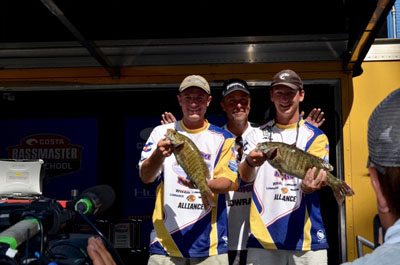 Call me jealous, but today’s youth anglers have it made. No, not because they have access to better tackle than I did as a kid, nor because they have better places to fish. And no, it’s not because of the fishing info abyss that is the Internet which today’s youth are the masters of exploiting. I’m jealous because competitive fishing has gone mainstream; a pre-teen kid these days can start fishing organized and sanctioned bass derbies complete with a national championship. By high school, that kid can compete in local and/or regional “open” tournaments, can win a state championship, and can go on to compete again at the national level. By college, our kid can fish for boats, trucks, and even entries into the highest form of BASS competition; the Bassmaster Classic, where even last place pays $10,000! See, today’s fishing kids are in a pretty good spot and you can help while growing as a person yourself.
Call me jealous, but today’s youth anglers have it made. No, not because they have access to better tackle than I did as a kid, nor because they have better places to fish. And no, it’s not because of the fishing info abyss that is the Internet which today’s youth are the masters of exploiting. I’m jealous because competitive fishing has gone mainstream; a pre-teen kid these days can start fishing organized and sanctioned bass derbies complete with a national championship. By high school, that kid can compete in local and/or regional “open” tournaments, can win a state championship, and can go on to compete again at the national level. By college, our kid can fish for boats, trucks, and even entries into the highest form of BASS competition; the Bassmaster Classic, where even last place pays $10,000! See, today’s fishing kids are in a pretty good spot and you can help while growing as a person yourself.I started volunteering to be a “boat captain” for youth events around 2002. Back then, I was just getting Fishful Thinker LLC off the ground as a guide business and working kids events was a feel good promotional thing. Fast forward to today, and it gives me the utmost pleasure to say that I just coached a Colorado high school team to the 2016 national championship, specifically beating 175 other high school teams from around the country and Canada in the Costa Bassmaster High School National Championship. Its been a long road and I can say unequivocally that I am a far better angler and person for it.
Organized scholastic competitive fishing is probably the hottest trend in fishing right now. Large companies like Costa, Berkley, Toyota and others have embraced the trend, ponying up dollars to build high quality events because they recognize that the future of the outdoors is in the hands of our youth. While not all kids who fish are cut out to compete, they will none the less be fans of those events based on my experience, and will participate in the sport at there own level with gusto when they see their peers on weigh-in stages and in TV coverage. There are high school competitive anglers with tens of thousands of followers on various social media; their peers are following their careers just as us old bass heads have followed the likes of KVD and Clunn. For the record, the high school national championship was covered live online and in a one hour show on ESPN a week later. Not too bad for a high school sport!
 The sponsorships are not just for major events; many of the the high school kids and teams have sponsors of their own as well. One of the kids on my team, 18 year old Ryan Wood, has had St. Croix Rods, Pflueger, and Stren on his resume for years. The teams often recruit local businesses as team sponsors to cover travel costs to big events and this is important for a couple of reasons; it gets the kids real world experience in dealing with companies while at the same time getting them to have some skin in the game so to speak; a lot goes into traveling across country to compete. In our case for the 2016 championship, we traveled 2,553 miles in my Tundra towing a boat, and eight nights in a hotel. In today’s age of entitlement, it’s great to have the kids help earn the money for travel if they want to compete.
The sponsorships are not just for major events; many of the the high school kids and teams have sponsors of their own as well. One of the kids on my team, 18 year old Ryan Wood, has had St. Croix Rods, Pflueger, and Stren on his resume for years. The teams often recruit local businesses as team sponsors to cover travel costs to big events and this is important for a couple of reasons; it gets the kids real world experience in dealing with companies while at the same time getting them to have some skin in the game so to speak; a lot goes into traveling across country to compete. In our case for the 2016 championship, we traveled 2,553 miles in my Tundra towing a boat, and eight nights in a hotel. In today’s age of entitlement, it’s great to have the kids help earn the money for travel if they want to compete.For the pre-high school events, boat captains - meaning the adult that has volunteered to take the kids out in the boat - are supposed to help the kids learn the sport of bass fishing. Everything from knot tying to lure selection to casting details can be taught while competing . By the time the kids compete at the high school level, boat captains are called coaches and teaching can only happen in practice. During events, a time out has to be called if the coach needs to teach, and like football, you only get a certain number of time outs and a half time. The coach basically drives the boat to wherever the kids want to fish (not the trolling motor; the kids have to do that), gives fishing advice during time outs, and basically supervises. At the collegiate level, only the kids are in the boat at all.
So how does this make the coach a better angler as I’ve suggested? Well, before you can teach something, you have to really break it down and learn how to effectively communicate the why’s and how’s of it. Then you get to sit and observe the kids fishing, to note what they did right and wrong, and how it could have gone better. It is common to notice details that I could do much better at just by watching them. In my case, learning directly from the kids also happens; they are very good at cutting edge techniques, data management, and generally have a fresh approach to stuff us old guys take for granted. More important than fishing skills, coaches get the gratification of helping today’s youth with something we are all passionate about; the outdoors lifestyle and the values it entails.
You want to feel major pride? Find a bass club in your area and teach some kids to compete. I guarantee you’ll all be better off for it!

